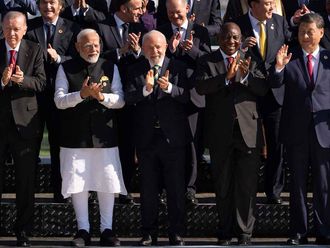
Washington: Obesity costs the US military some $1.24 billion every year and is the top reason the Pentagon can’t meet its annual recruitment quotas, according to a new study that highlights the armed services’ ongoing struggles to address the crisis.
The services disqualified 52,000 applicants from active duty in fiscal year 2023 because of obesity, far more than the 41,000 recruitment shortfall in that time, according to the report from the American Security Project. Obesity remains the biggest reason for disqualification, according to the report by the project, which bills itself as working to “forge a bipartisan consensus on a new national security strategy.”
The report underscores the cascading challenges of an overweight military, with costs that impact operational readiness and burden the services’ health-care systems. But commanders are often reluctant to confront the issue because obesity is so difficult to treat — and may result in more expulsions. It said obesity jeopardises the lives of veterans more than actual combat.
“The United States Armed Forces face an unprecedented challenge as obesity rates across the services continue to rise,” the report found. Among the burden associated with obesity were health-care costs linked to musculoskeletal injuries and diseases, sleep apnea and hypertension, it said.
The issue is an urgent one because the armed forces are facing the biggest recruitment crisis since President Richard Nixon ended the draft in 1973. According to the report, military efforts to address the problem have largely failed, with weight programmes found to cut weight by less than 1 per cent among active-duty troops, and none shown to keep the weight off over time.
“Providers and commanders are fearful that, by treating obesity, they are going to get folks kicked out of the military,” Dr. Richele Corrado, who runs the weigh management program at Walter Reed National Military Medical Center, said in a statement. “Researchers don’t study military weight loss programs beyond six months or a year because we know all that weight is coming back.”
A report from the Government Accountability Office earlier this year found that the Department of Defense hasn’t fully addressed congressional demands to give soldiers better access to nutritious food.
“According to DOD, poor health and nutrition are growing challenges that threaten U.S. military readiness and its ability to retain a fit and healthy force,” the GAO report said.
The American Security Project report didn’t explore the possibility of introducing powerful new weight-loss drugs such as Ozempic and Wegovy to the armed forces except to say weight-loss drugs “have been found to be highly effective” but need to be used continually for the best results.












